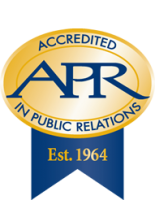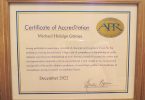New research published in the journal, Public Relations Review, supports the value of the Accredited in Public Relations (APR) credential when it comes to preparedness and likelihood to offer ethics counsel. Through survey research with more than 400 educators and practitioners, the study also provides evidence that the majority of practitioners and educators believe ethics counsel is public relations’ responsibility.
The findings are based on survey research conducted with PRSA members during ethics month in 2015. The study was jointly sponsored by PRSA’s Board of Ethics & Professional Standards and the Arthur W. Page Center.
The survey was distributed via an email invitation from PRSA to a random sample of 7,404 practitioners and to 690 educators using the AEJMC Public Relations Division and PRSSA faculty advisers email lists during the month of September 2015 in recognition of ethics month. The response rate was 4.6% for practitioners (n = 340) and 15% for educators (n = 106).
Significant Differences Found Among Accredited Practitioners
This study found evidence of statistically significant differences among public relations practitioners who are APRs compared to those who are not. Accredited practitioners were more likely to say:
- They personally felt prepared to provide ethics counsel (APR Mean = 4.42, non-APR Mean = 3.61; t(295) = 7.153, p = .000),
- To believe that practitioners should provide this type of counsel (APR Mean= 4.64, non-APR Mean = 4.22, t(296) = 4.284, p = .000)
- And to report that they personally were likely to provide ethics counsel (APR Mean = 3.96, non-APR Mean = 3.39, t(297) = 4.145, p = .000).
These findings are consistent with previous research that found that accredited practitioners were more likely to engage in public relations ethics competencies when compared to non-accredited practitioners (Sha, 2011) and offer further support for the value of accreditation.
The study also provided evidence of practitioners and educators’ support for ethics counsel based on public relations’ role as boundary spanners. The statement that “public relations practitioners have an obligation to represent the ethical concerns of key stakeholders” received the strongest agreement from practitioners (M=4.61) and educators (M=4.71) among four statements in a scale supporting ethics counsel.
Areas of Concern

The results present a less encouraging picture regarding the availability of ethics training in the workplace. A previous study in 2010 with a comparable sample size of PRSA members found 52% of the respondents reported that their employers did not provide ethics training (Lee & Cheng, 2012), and 63.4% of the respondents in this study also said the training is not provided.
While practitioners reported that ethics training is not provided at most workplaces, they also reported that accreditation was the most common form of professional development related to ethics that PRSA members are taking advantage of through the professional association. The second most popular format for ethics training was PRSA chapter programming.
In addition, accredited and non-accredited practitioners and educators all appeared to be concerned about the issues of the readiness of practitioners as well the necessary power and influence to provide ethics counsel. The responses to both statements received neutral responses from educators and slight disagreement to neutral responses from practitioners when suggesting that practitioners do not have adequate training.
While the majority of practitioners (70%) perceived themselves as prepared, they may question the readiness of younger practitioners or those who are not members of PRSA. Finally, both educators and practitioners ranked lack of access to leadership and information as the third most challenging issue facing public relations practitioners today.
This study provides evidence that public relations practitioners believe that they should provide ethics counsel and that they feel prepared to do so. However, practitioners may need additional training as new ethical issues emerge with changes in technology. Practitioners should pursue accreditation, which can provide ethics training and improve their confidence in their ability to provide ethics counsel.
References
Lee, S., & Cheng, I. (2012). Ethics management in public relations: Practitioner
conceptualizations of ethical leadership, knowledge, training and compliance. Journal of Mass Media Ethics, 27(2), 80-96. doi:10.1080/08900523.2012.694317
Sha, B. (2011). Accredited vs. non-accredited: The polarization of practitioners in the public
relations profession. Public Relations Review, 37(2), 121-128.
Dr. Marlene S. Neill is an assistant professor at the Baylor University in the Department of Journalism, Public Relations & New Media. Her research focuses on public relations management, ethics and integrated communication. She has published research in the Journal of Mass Media Ethics, Public Relations Review and the Journal of Communication Management. She is a member of the PRSA Board of Ethics & Professional Standards. Follow Dr. Neill on Twitter @neillpr.








[…] Source link […]